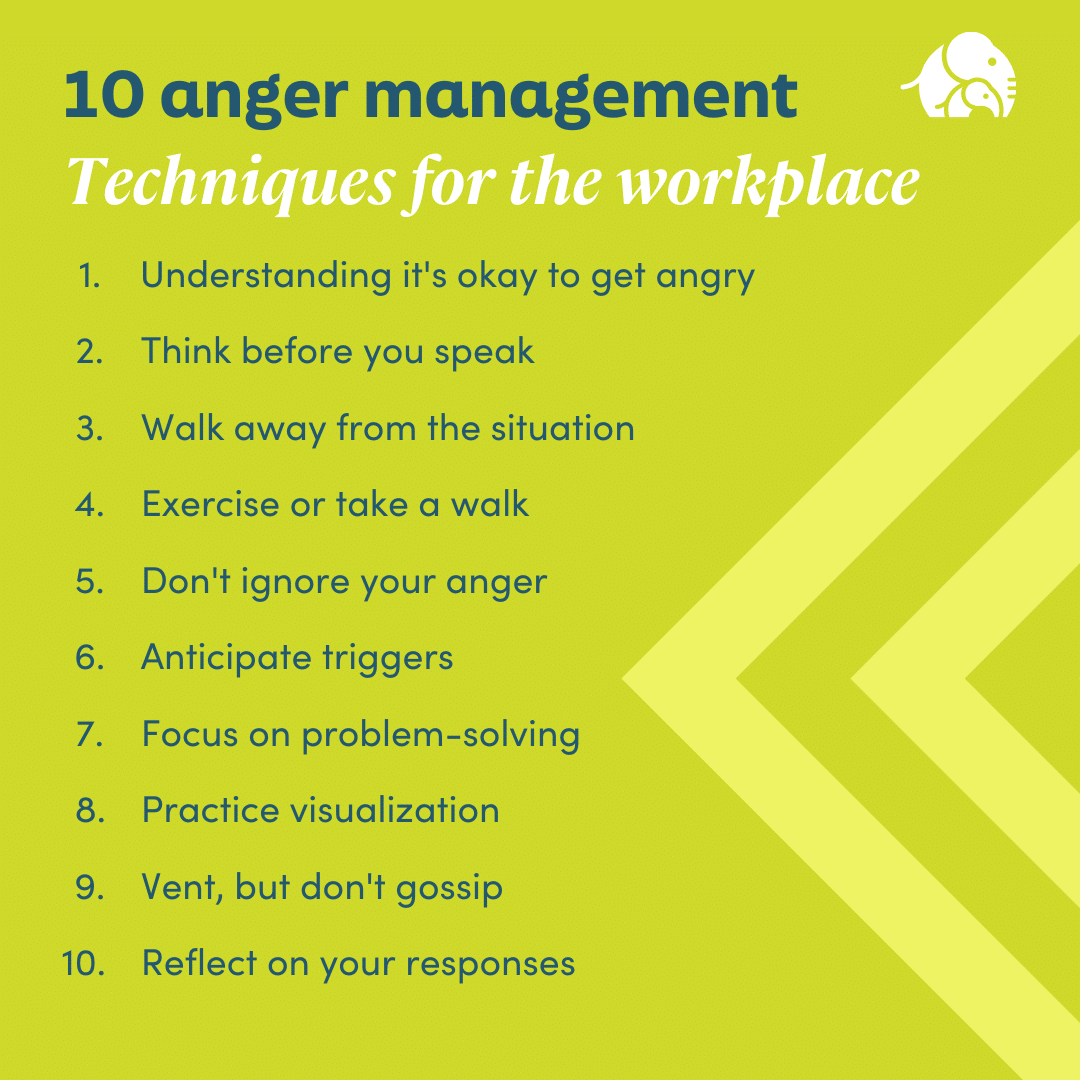Workplace anger has always been common, and living through the aftermath of the global pandemic certainly hasn’t helped with alleviating work-related stress. If fluctuating work stressors are making it hard for you to keep your cool at work, you’re not alone. One Gallup poll in 2022 found that 60% of employees claimed they felt emotionally detached from their jobs in the past year, and about 20% described their time at work as “miserable.”
2022 was also the year when the business world began buzzing about quiet quitting, a term that describes only putting forth the bare minimum of effort at work. Employees across every industry are dealing with anger at work, and many aren’t sure how to cope with this rage and resentment in a healthy way.
While experiencing anger or frustration isn’t a bad thing in itself, poorly managed rage can lead to a wide range of problems, including violent outbursts, resentment, poor work ethic, and job loss.
Are you struggling to contain your anger at work? Reach out to Ellie Mental Health and get matched with a therapist near you.
7 Reasons You Might Be Struggling With Anger at Work
If you often feel angry at work, reflecting on why you are experiencing so many negative emotions is a good place to start. While there are certainly outside factors, like a toxic work environment, that can suck your mental energy and cause frustration, it’s important to remember that managing anger effectively is ultimately your responsibility.
You’ll want to get to the root of the problem and understand your personal triggers that are contributing to your anger.
1. You Have Poor Work Relationships
Maybe you don’t get along well with your boss or have had issues with coworkers in the past that haven’t been resolved. If you don’t really like the people you work with or you constantly struggle to communicate or get work done because of relational issues, this is going to lead to frustration on both ends. If you’re experiencing workplace harassment or discrimination, this can also cause your anger to grow.
2. You’re Unsatisfied With Your Job
A recent survey by JobSage found that only 10% of Americans claim to be working their “dream job,” 70% don’t think they’re on track to land their ideal career, and 53% don’t think their jobs are a good fit for the current economy. If you’re in a job that’s just there to make ends meet and doesn’t fulfill you, you’re more likely to feel discontented and frustrated with your work.
3. You Have a Loaded Workload
If you have an enormous pile of work to get through each day, and more responsibility than you can feasibly handle, this is a recipe for burnout and rage. You might feel out of control, chronically stressed, and frustrated at how much is expected from you.
4. You Have Poor Work-Life Balance
Working long hours and having little time to practice self-care, to spend with your loved ones, or pursue outside hobbies can leave you feeling like work is all there is in your life. Without an outlet or rest from workplace duties, you’re likely to feel overworked and experience issues in other areas of your life.
5. You Have an Underlying Mental Health Issue
Even if you’ve landed your dream job and have the best boss and coworkers in the world, poor mental health can take a serious toll on your work and make managing negative emotions, like anger, incredibly difficult.
6. You’re Struggling With Personal Issues Outside of Work
Maybe you are dealing with a rocky relationship, you’re struggling to make adult friends, or your child is struggling in school. Whatever the case, it can be difficult to keep your work and personal lives separate. If you’re struggling with a stressful or emotionally straining situation at home, you’re more likely to be irritated, depressed, and on edge at work.
7. You Feel Overlooked or Under-compensated
Working hard with little reward can be incredibly frustrating. Maybe you’re putting in extra hours or effort and aren’t getting recognized by your peers or boss. Or maybe you’re not being fairly compensated for your skill level or experience. Either way, no one wants to feel like their hard work is for nothing.
How to Manage Anger at Work: 10 Techniques to Employ

If any of these causes of workplace anger resonate with you, then you’re getting closer to understanding and effectively managing your anger. When anger arises and you can feel an outburst coming on, here are 10 tips on how to react.
1. Understand That It’s Okay to Get Angry
Feeling angry is a completely normal response to an irritating situation. The key is to be aware of your anger so that you can course-correct. If you feel overwhelmed and panicked the moment you feel your emotions rise, you’re more likely to lose control and react in a way you’ll regret. Rather than try to bottle up or escape from these extreme emotions, when you feel angry, aim to identify and accept what you’re feeling.
2. Think Before You Speak
Once you recognize that a certain situation or person is contributing to your negative emotion, it’s time to take a breath and slow down. Resist the urge to immediately defend yourself or attack back. Instead, allow yourself time to process what was said, stay calm, and formulate an appropriate response.
You can also attempt to productively communicate by choosing your words carefully. For example, avoid sweeping statements and try to start sentences using “I” instead of “you.”
3. Walk Away And Take a Few Deep Breaths
When your stress peaks, you might not have the patience or mental energy to respond to the situation in a constructive way. In these situations, sometimes the best solution is to take a voluntary timeout and walk away. Take time to cool down, get some fresh air, think about your next steps, and then return to address the situation.
4. Wind Down With Some Exercise
Sometimes when you’re incredibly angry, trying to sit and calm down can only aggravate you more. If you feel restless and on edge, exercise might be the best solution for letting off steam and clearing your head. If you have work from home or have access to a gym, now is a great time to take advantage of it. If not, even some light stretching or a brisk walk around the office building can help.
5. Don’t Ignore Negative Emotions
Few people have an outburst when faced with just one stressful situation. Often, this anger boils up over time and is fueled by unresolved resentment from multiple stressors. The longer you let issues stew, the more likely they are to boil over. Rather, once you’re in a calm and steady state of mind, address issues in a productive way.
6. Identify Possible Triggers
If you frequently struggle with being angry at work, it’s good practice to start anticipating stressful or frustrating situations. If anger takes you by surprise, you may resort to your first reaction. However, if you have a game plan in place for when you feel frustrated, you’ll have the self-confidence and clarity to respond in a healthy way.
7. Focus on Problem-Solving
When faced with stressful events at work, think less about how angry you feel and place more focus on what you can do to mitigate the situation. For example, if your boss drops work on your lap ten minutes before your shift ends, you can choose to do the work and feel angry every moment of it, or you can consider your options and possible solutions for addressing the situation.
If presenting concerns to your supervisor, be sure to include some suggestions for improving the situation rather than just venting about the perceived problem.
8. Practice Visualization
If you can’t physically leave your workplace, you can mentally take a break using visualization. When you recognize that anger is creeping up, take a deep breath and visualize somewhere you’d love to be. Maybe you imagine yourself at home spending time with your loved ones, picture what it would be like to relax at a beach somewhere, or reflect on a peaceful memory.
This act of visualization can help you calm down, get out of fight or flight mode, and be in the right headspace to handle your anger appropriately.
9. Vent, But Don’t Gossip
Talking with someone you trust about the situation can help you get a second opinion, feel validated for how you’re feeling, and get some weight off your chest. However, you want to be careful that you’re not gossiping. It might be best if you speak to someone outside of work about the situation or schedule time with HR (or your supervisor) to discuss what you’re feeling.
10. Reflect on Your Responses
Too often people get angry, respond poorly, and move on without thinking about what happened. When faced with a stressful situation, take a few moments to reflect afterward. Consider what caused you to be angry in the first place, how your mood was before the trigger, why you think it made you feel that way, and what your response was. What was the outcome? What did you do well? What could you have done better? If you responded poorly, can you do anything to improve the situation?
Get Professional Help in Managing Anger at Work
Anger management is a learned skill, and if you have a lot of bottled-up emotions and stress at work, you might not even know where to begin. While these tips can all help you feel less angry at work, sometimes more investigation and work are needed.
If you have a mental health condition that’s contributing to your anger or you are struggling to identify the underlying causes, a therapist can help. Together, you can dig into your habits, your past, and other stressors in your life that are making it difficult for you to manage anger.
Ready to get started? Get anger management help from an Ellie therapist near you.


